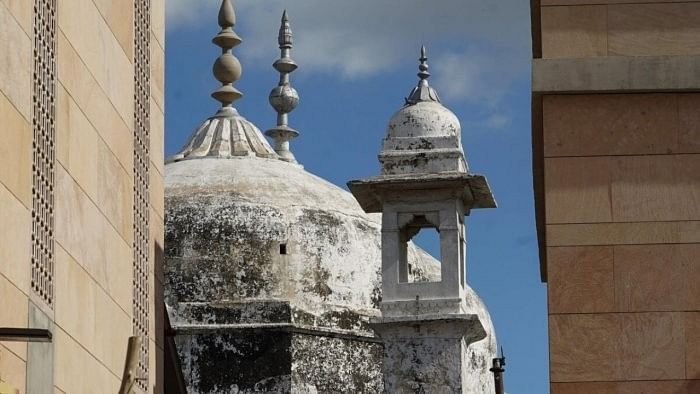
The Gyanvapi mosque.
Credit: PTI File Photo
Lucknow: The Allahabad High Court on Monday rejected a plea challenging the order of a Varanasi district court that permitted 'puja' at one of the cellars (known as Vyasji ka tehkhana) in the contentious Gyanvapi Mosque complex, which is adjacent to the Kashi Vishwanath Temple.
A single bench presided over by Justice Rohit Ranjan Agarwal issued its ruling on the petition filed by the Anjuman Intezamia Masjid, which oversees the affairs of the Gyanvapi Mosque.
In its order, the court stated that the decision by the then Uttar Pradesh government to halt 'puja' at the cellar, which had been ongoing since 1993, was 'wrong'.
It further stated that the 'Vyas family', which had been conducting 'puja' at the cellar, should not have been denied access based solely on an oral order. Additionally, the court noted that the Muslim side had failed to establish prima facie possession of the cellar.
The lawyer representing the Hindu side argued that the family of Somenath Vyas had been performing 'puja' at the cellar continuously until 1993 and that the order of the Varanasi court did not infringe upon the rights of Muslims to hold prayers in the Mosque.
Conversely, the lawyer for the Mosque Committee contended that the Varanasi court made an error in permitting 'puja' at the cellar, as the Vyas family had transferred the right to worship to the Kashi Vishwanath Trust much earlier.
The High Court had earlier refused to stay the 'puja' at the 'tehkhana', which started January 31 after a district court allowed a plea for restoration of worshipping rights there.
The district court had permitted worship in the Mosque's basement and instructed the district magistrate of Varanasi to make necessary arrangements within a week. However, 'puja' commenced at the basement at midnight, merely a few hours after the district court's order.
The 'tehkhana' (basement), popularly known as 'Vyasji ka Tehkhana', where 'puja' was performed after nearly 30 years, reportedly contained idols of Hindu gods and goddesses along with items used in the rituals.
Situated beneath the Gyanvapi Mosque on its south side, Shailendra Pathak Vyas, whose petition led to the Varanasi court's order, argued that his family had been conducting 'puja' there since the British period.
He further claimed that his father, Somenath Vyas, used to perform 'puja' there until October 1993, after which the government under Mulayam Singh Yadav erected a barricade and barred their entry.